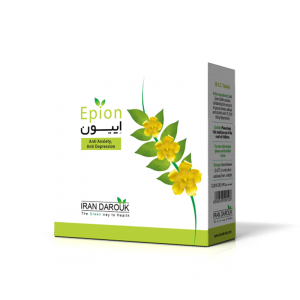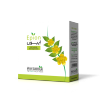Epion
- Sedative, anti-anxiety and antidepressant
- Treatment for neurologic sleep disorders
- Treatment for neurological spasms
Consumer Medicine Information (CMI)
EPION
• Ingredients and active components
Made of standardized dry extracts of St. John’s Wort (Hypericum perforatum L.), Passion flower (Passiflora incarnata L.), and Valerian (Valeriana officinalis L.)
Each Epion tablet contains standardized dried extracts of 65 mg St. John’s Wort (Hypericum perforatum L.), 60 mg passion flower (Passiflora incarnata L.), and 30 mg valerian (Valeriana officinalis L.).
Active ingredients include:
Hypericum perforatum L.: Hyperforin, Flavonoids: biflavonolids and amentoflavone
Passiflora incarnata L.: Flavonoids: Apigenin and Chrysin
Valeriana officinalis L.: Volatile oils, Sesquiterpenes such as Valerenic acid, and Caffeic acid derivatives
• What EPION is used for
- Sedative, anti-anxiety and antidepressant
- Treatment for neurologic sleep disorders
- Treatment for neurological spasms
• How EPION works
Valeriana officinalis L.: Human clinical trials show that the plant Valeriana officinalis has sedative effects, which are mostly related to its volatile oils.
Biochemical studies show that Valerenic Acid inhibits Gamma-Aminobutyric Acid (GABA) catabolism in the synaptic connections in the central nervous system. This leads to high concentrations of GABA in the brain tissue which causes sedative effects.
Hypericum perforatum L.: The antidepressant effects of this plant are due to its Hyperforin compounds, which inhibit the absorption of norepinephrine, dopamine, glutamate and GABA. Also, Bioflavonolids and amentoflavone that are found in this plant inhibit serotonin receptors, particularly 5- HT (1D) and 5—HT(2C). In addition, it reduces corticotropin-releasing hormone (CRH) and the release of interleukin 6.
Passiflora incarnata L.: The anxiolytic and sedative effects of this plant are due to Flavonoids including Apigenin and Chrysin, which bind to GABA receptors A and inhibit the reuptake of GABA neurotransmitters. Finally, GABA concentration increases leading to soothing and anxiolytic effects.
• Before you use EPION
When NOT to take it
- Should not be used in children and adolescents under 14 years old.
- Individuals with photosensitivity should avoid using this drug. If used, they should avoid exposure to UV radiation.
Use during Pregnancy and Lactation
Should NOT be used during pregnancy and breast-feeding.
• Taking EPION
How and when to take it
- Children between 6-12 years old: take 1-3 tablets a day after consulting a physician.
- Adults: 1-2 tablets three times a day (maximum dose is up to 5 tablets a day).
- In case of insomnia, 1-2 tablets should be taken with liquids one to two hours before sleep.
- Do not break the tablet in half.
- This drug can be used at any time.
How long to take it
In case of any physician recommendation, continue taking it until the visible symptoms have improved.
What to do if you miss a dose
If you miss a dose of Epion, try to take it as soon as remember if it’s almost time for the next dose, skip the missed dose and take your next dose at the regular time. Do not the same doses of it at the same time.
• While you are taking EPION
Things you must do
- Consult a physician if this drug is used simultaneously with drugs with the same mechanism of action (MAO inhibitors).
Things you must not do
- Should not be used concurrently with anticoagulants such as heparin and warfarin.
- Concurrent use of this medicine with digoxin is not recommended.
Things to be careful of
- Concurrent use of this medicine with inhibiting and immunosuppressive drugs (cyclosporine, tacrolimus, and sirolimus), protease inhibitors or non-nucleoside reverse transcriptase inhibitors (NNRTIs) that are used to treat HIV, and cytostatic drugs except monoclonal antibodies, is not recommended.
- Concurrent use of this medicine with benzodiazepines and barbiturates increases the sedative effects.
- Concurrent use of this medicine with drugs metabolized by cytochrome P450 may decrease the concentration of medicine such as oral contraceptives, cyclosporines, anticonvulsants, and carbamazepine.
- Concurrent use of Epion with serotonergic drugs (nefazodone, paroxetine) and SSRIs may increase such adverse effects as nausea, vomiting and agitation.
- The use of this medicine with theophylline, verapamil, simvastatin, and midazolam, can decrease their pharmacological effects.
- It is not recommended to use this medicine concurrently with alcohol.
- When working with heavy machinery: there is a chance of drowsiness for individuals that take this drug for the first time.
• Side effects
- This drug has no mentionable adverse effects. Although, there are a few reports of gastrointestinal problems, allergic reactions, and sedation, in the beginning of treatment.
• After taking it
Storage
- Store in a dry place, keep away from direct sunlight and below 25 °C.
- Keep out of sight and reach of children.
Disposal
Do not put into sewer lines. Dispose in the everyday rubbish bin.
• The Product
What EPION looks like
Dosage Form: Controlled-Release Coated Tablet
Packaging: 3 blisters each one containing 10 tablets inside cardboard package; patient information leaflet inside.
Manufacturer
This product is made from high quality local and imported herbs organically planted and harvested. It has been formulated by Iran Darouk Pharmaceuticals.



Comments
Add new comment